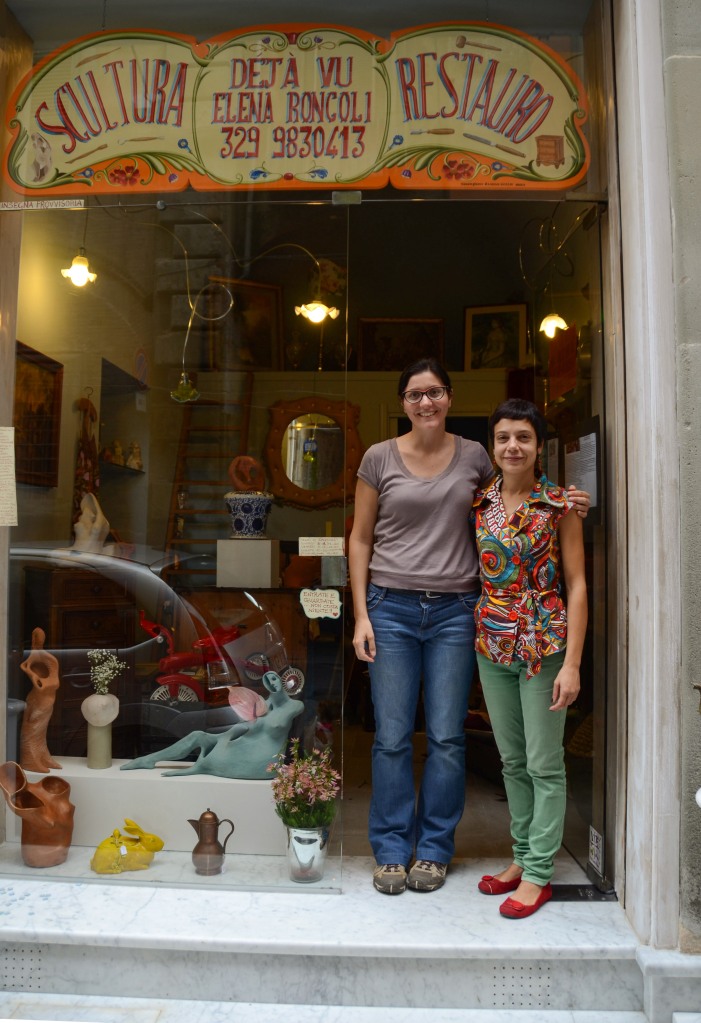
Insegna realizzata per l’attività “Déjà vu” di Elena Roncoli a Pisa
La progettazione dell’insegna per l’atelier dell’artista Elena Roncoli è derivata da un’attenta analisi dell’attività da lei svolta. Ho tenuto conto del nome “Déjà vu” letteralmente “Già visto”. Da qui nasce l’idea di ispirarsi a uno stile storico ricco di richiami allo stile decorativo di inizio Novecento e in particolare al Fileteado, lo stile argentino tipicamente usato a Buenos Aires. Uno stile capace di richiamare alla memoria antichi mestieri, che nella stessa Pisa venivano praticati negli anni passati, e, al contempo, restituire la memoria storica ad una della più antiche vie della città: Via San Martino.
Il progetto dell’insegna ha ricevuto anche l’approvazione della Soprintendenza per i Beni Architettonici, Paesaggistici, Artistici, Storici ed Etnoantropologici per le province di Pisa e Livorno.
Nell’insegna stessa la parola “scultura”, con la rappresentazione di una delle opere dell’artista e degli strumenti per realizzarla, richiama l’attenzione del passante sulla materia prima (la creta), e dunque sulla scultura a levare.
Fa da contraltare alla parola “scultura” la scritta “restauro”. Anche in questo caso l’intento è quello di attrarre lo sguardo sull’icona del mobile e degli strumenti principali del restauratore del legno. La parola scritta è stata volutamente sostituita dalle immagini per rendere più chiaro e sintetico il layout dell’insegna.
La scelta dei colori deriva dalla calibrazione delle tonalità dominanti delle architetture che fanno da sfondo all’insegna stessa, al fine di ottenere una visione d’insieme che risulti armonica dal punto di vista cromatico e formale.
Il materiale impiegato è una tavola sagomata di legno di faggio che misura 60 x 200 x 1,5 cm. Le decorazioni sono realizzate con colori acrilici, protetti con vernice finale.

Sign of Elena Roncoli’s studio “Déjà vu” in Pisa (Italy)
The planning of the sign for artist Elena Roncoli’s studio is derived from an accurate analysis of her activity. I have kept in mind the name “Déjà vu” – literally “Already seen.” From here it is born the idea to inspire to a historical style full of recalls the decorative style of the beginning of the Twentieth Century, and particularly to the Fileteado, the Argentinian style typically used in Buenos Aires. A style able to recall to the memory the ancient works practiced in the past years in the same Pisa, and, in the meantime, to bring back the historical memory to one of the most ancient streets in the city: via San Martino.
The Soprintendenza per i Beni Architettonici e per il Paesaggio and per il Patrimonio Storico Artistico ed Etnoantropologico for the Provinces of Pisa and Livorno (a peripheral organ of the Ministry of Cultural Heritage and activities) approved the sign design.
In the same sign the word “scultura” (sculpture), with the representation of one of the works of the artist and the tools to realize it, it recalls the attention of the pedestrian on the raw material (the clay), and therefore on the clay sculpture.
Act as counterpart to the word “scultura” (sculpture) the writing “restauro” (restoration). Also in this case the intent is to attract the look on the icon of piece of furniture and on the principal tools of the wood restorer. The written word has been deliberately replaced by the images to make the layout of the sign clearer and synthetic .
The choice of the colors derives from the calibration of the dominant hues of the architecture, that frames the sign with the purpose to get an overall view that results harmonic both chromatically and shape wise.
The material employee is a shaped table of beech measuring 60 x 200 x 1,5 cm.
The decorations are realized with acrylic colors, protected with final varnish.



